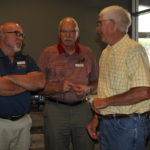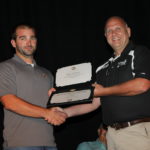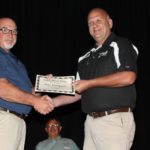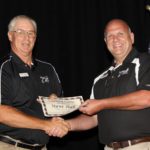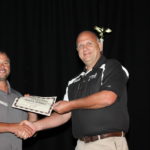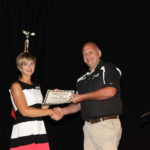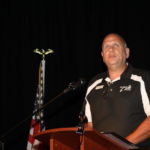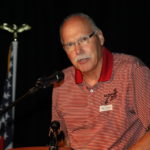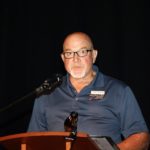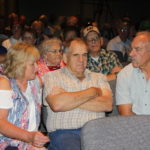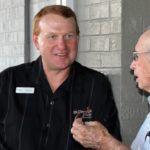McDonough Power 79th Annual Meeting
Members of McDonough Power Cooperative were updated on the co-op’s power supply and power diversification at the 79th Annual Meeting of Members held Tuesday, August 16, at The Crossing in Macomb.
President/CEO Mike Smith discussed how power supply and power portfolio diversity are changing at McDonough Power. Recent survey results indicated that the cooperative showed significant improvement in most areas since the last survey in 2011. However, marks for supporting renewable energy were the lowest. Smith explained that setting rates, and buying and selling power is complicated in today’s changing and volatile energy market. It requires constant monitoring from various organizations to manage risk and ensure adequate and diverse power supply at the lowest possible price for all the co-op’s members.
McDonough Power, and its generation and transmission power cooperative, Prairie Power, Inc. (PPI) in Jacksonville, work together to secure contracts for power, 60 percent of which comes from the Prairie State Generating Campus (PSGC) in Marissa. Smith said, the mine-mouth plant is the most environmentally sound facility of its type in the country, meeting all emissions standards, while eliminating costly coal transportation costs by being fed by an on-site coal mine.
Other sources of power include power from other contracts, day-ahead market purchases and renewable energy such as solar and wind. Although fluctuations in power use are factored into contracts, extreme weather swings such as the “polar vortex” mean expensive power from the open market had to be purchased. Smith said, “Buying power from the market at that time is not a good place to be. On the flip side of having a contracted price, the daily price of power can go up and that is the risk. It is the same kind of decision homeowners make when getting a loan. Do you take the fixed rate, or that lower variable rate? If you are a seller in a rising market, it is a good thing, but being a buyer in a rising market can be disastrous.”
Smith further explained that issues such as the low price of natural gas, the shuttering of some nuclear plants and new renewable energy sources are also changing the marketplace for power and increasing risk. To manage risk, PPI is helping manage risk with diversification. For example, the co-op has purchased the right to buy up to 20 megawatts (MW) of power from the Pioneer Trail Wind Farm in Paxton. Smith said, “Periodically, we are approached about new wind farms that are being proposed, but typically the cost of power is just too high.”
Solar power is becoming more prevalent in McDonough’s service territory. And PPI has installed two 500 kilowatt (kW) solar sites, and will soon be offering McDonough Power members the opportunity to purchase blocks of solar-produced kilowatt hours (kWh) through the community solar Bright Options Solar project. Smith said, “The first question you might have is if I purchase solar power, will my bill go down? The answer is no, it will actually go up.” The reason, he said, is that the cost of solar is very high compared to other types of generation. Solar is a rather large investment in land, labor, equipment and financing cost. And while solar output is limited to 25 percent capacity, coal, some natural gas and nuclear plants have 85 percent capacity.
Smith explained, “I actually did a calculation some time ago to figure out what size solar farm would match Prairie State’s output, and it was more than 100 square miles.” That said, the price of solar is receiving state and federal support and demand is helping to bring the price down.
Rooftop solar is what is generally found in residential applications. If sized correctly it can generate enough kWh to meet a home’s power needs during sunny days. And the member could sell any additional kWh not used in the home back to an electric provider at full retail credit. This is referred to as net metering. Smith said, “This net metering is a good deal for the solar generator, but not so good for the cooperative or other members. The reason is we are essentially purchasing those solar kWh’s from the solar member at the retail rate, instead of the wholesale rate. When we buy kWh’s at the retail rate, part of the fixed cost it takes to keep the wires in the air and trucks rolling is not being recovered. To be fair, those costs must be recovered, or that cost will have to be spread across all our other members.” He added, “Green energy is a good thing, but only if it is implemented fairly, and that is our goal at McDonough Power.” The board will continue to evaluate the best way to support renewable energy to make it fair and viable for the co-op and its members, he added.
Smith explained how co-ops such as McDonough Power differ from investor-owned utilities, saying, “If you have a meter on McDonough Power Cooperative lines, you are one of the
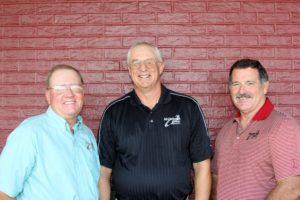
Members of McDonough Power Cooperative re-elected three area men to the organization’s board of directors. The re-elected directors from left are: Walt Lewis of Blandinsville, Steve Hall of Roseville and Mike Cox of Macomb.
members of the co-op. We have a democratic process of leadership, meaning that our board members are not appointments; they are elected by the membership, which is part of what we are doing here tonight, electing three board members. Each board member provides representation for the district they serve. In addition, board members set policy and rates for the cooperative. That all happens locally.”
During this year’s meeting, Walt Lewis of Blandinsville, Steve Hall of Roseville and Mike Cox of Macomb were re-elected to the co-op’s board of directors, which demonstrates the “democratic member control” cooperative principle.
Commitment to community is another of the seven principles that are the foundation of cooperatives. Chairman Steve Lynn discussed some ways the co-op demonstrates this core principle. They included the new Operation Round-Up program the membership approved at last year’s annual meeting. Since the program was implemented, donations have been made to local organizations such as food banks, volunteer fire departments and hospitals. Lynn said, “While we are just in the beginning of this program, we are seeing the generosity of our membership applied to several meaningful programs that serve our communities. Our hope is that this program will continue to grow and serve others for years to come.”
Other ways McDonough Power gives back to the community is through Coats for Kids, funded by sales of scrap wire and generous donations from co-op lender CoBank, and programs to help area youth learn about state and federal government such as Youth Day at the Capitol in Springfield and the Youth to Washington Tour.
The “cooperation among cooperatives” cooperative principle is often demonstrated during major outages when co-ops come together to help a co-op in need of assistance. Lynn discussed outages in the past year that resulted in significant damage to the co-op’s power lines. He explained that sometimes outages on transmission lines trigger outages on McDonough’s distribution system. He explained, “When outages occur, we call on our linemen to work long hours restoring power and even call on other co-ops to send assistance to get everyone on as quickly as possible.” He added, “We appreciate your patience, and rest assured we are working as hard as we can to restore power as safely and quickly as possible.”
This year’s LaVern and Nola McEntire Lineman Scholarship was awarded to Austin Swango of Charleston. The one-year, $1,500 scholarship will help to defray the costs to attend the line worker’s school conducted by the Association of Illinois Electric Cooperatives in conjunction with Lincoln Land Community College in Springfield.
During the treasurer’s report, David Lueck reported that the co-op saw $307,730 in operating margins for the year.

